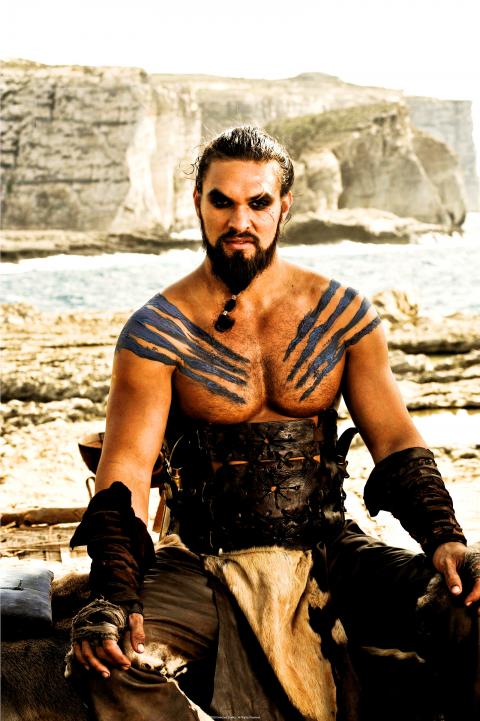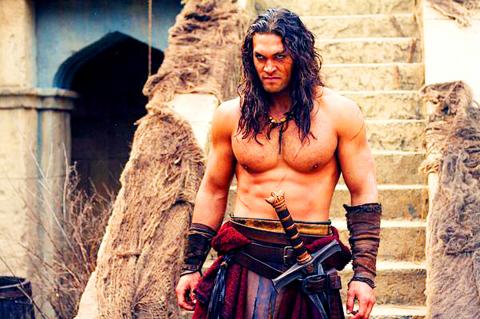It is a bumper weekend for swords and sorcery fans with the release of Marcus Nispel’s remake of John Milius’ campy Conan the Barbarian and the hugely successful (13 Emmy nominations) HBO adaptation of the first book in George Martin’s five-novel fantasy epic A Song of Ice and Fire. The two share a star in the form of Jason Momoa and a delight in the graphic portrayal of violence. Despite that, the results are startlingly different.
For those brought up on the stylized silliness and ideological pretensions of the 1982 Conan the Barbarian, which achieved a cult following and helped launch Arnold Schwarzenegger in his cinematic career, the remake cannot help but be a disappointment. This is not to say that technically it is not a much better film, but that the absence of the ridiculous humor, both intentional and otherwise, diminishes it. It is instructive to remember that the first Conan film opened with a quote derived from Nietzsche (“what doesn’t kill us makes us stronger”), and had a wonderfully atmospheric narrator in the Japanese actor Mako, who could read lines of the utmost silliness and impose on them some element of grandeur.
Morgan Freeman, who serves as the new narrator, a great actor who has survived many projects unworthy of his talents, seems here unable to muster any conviction in the rendition of his perfunctory lines.

photo courtesy of Catchplay and HBO
All the effort in the filmmaking for the new Conan the Barbarian seems to have gone into a taste for nasty violence, some of it quite successfully shocking. There are also some very energetic fight sequences. But there is something lacking throughout, and that something is chemistry. Not just chemistry between the cast members, but also between the filmmakers and the audience. However ridiculous the aspirations of the first Conan movie to achieve a cartoon take on Nietzsche, the absence of any aspirations at all, other than an aim to entertain, are a fatal flaw in this new film.
Accepting that this is a big-budget B-movie, it must be said that there are a number of quite descent performances, starting from Ron Perlman as Conan’s father, who manages his utterly improbable and not particularly well-scripted role with his usual professionalism, to Rose McGowan, whose role as the Gothic horror princess is carried off with great conviction. There is no shortage of talent on screen, but the age of heroes has passed, and even great villains are hard to come by these days. With all due respect to Stephen Lang, who works hard at playing the villain Khalar Zym, his performance is small potatoes compared with the inspired camp of James Earl Jones as Thulsa Doom, a far more improbable bad guy, who, with his crazy inward stare and brilliantly stylized dialogue (who can ever forget “contemplate this upon the tree of woe”), still seems a more vital part of the nexus between art and society than this remake will ever be.
As pure entertainment, if you like the sound system turned up high and viscera flying about in all directions, Conan the Barbarian is a more than adequate film, with plenty of good effects. Its greatest failing is that it makes even such an inadequate film as its predecessor look good by comparison.

photo courtesy of Catchplay and HBO
Conan the Barbarian can be seen in 3D with all the benefits of a highly sophisticated audiovisual environment. Game of Thrones, the HBO original mini-series that premieres on Sunday, is proof, like The Sopranos and Six Feet Under, that the smaller and more intimate, medium of television is still very much alive and can take on the big boys of the big screen at the business of telling a ripping good yarn.
This is swords and sorcery conceived on a massive scale, and has been described as The Sopranos meets Middle Earth. It does not achieve the intensely cynical worldview purveyed in The Sopranos, nor the transcendental folkloric faith that drives Lord of the Rings, but it finds its own way somewhere in between. It mixes up the kind of sexuality and intrigue that proved such a draw in another HBO series, Rome, and the extreme brutality, bloody violence, softcore sex and beautiful bodies that characterized the appeal of Spartacus: Blood and Sand. It’s almost a perfect mix. More importantly, Game of Thrones has the budget, on-screen talent and a prodigious screen writing team that manages to keep a complex story together.
It would be meaningless to provide a synopsis of this vastly complex story, but it’s sufficient to say that it deals with a group of powerful families struggling for the throne that commands seven kingdoms. The cast is huge, and the world in which the action takes place is one in which the seasons can last for years and in which many supernatural forces are active. The first series of 10 episodes has a strong cast that includes Sean Bean as the taciturn lord of the kingdom’s northern vastness, and there are brilliant performances by Peter Dinklage as the dwarf son of a powerful family seeking to make his own way, Iain Glan as a servant of an ancient dynasty seeking to restore its rights over the kingdom, and, as mentioned at the beginning, Jason Momoa as Khal Drogo, a barbarian warrior lord who does great credit to his personal trainer.
While Momoa does not have to do much acting in this role, his physical presence manages to achieve more in The Game of Thrones than it does in Conan the Barbarian. Once again, a reminder that script and story make all the difference, and even acting that relies more on brawn than method can achieve much if it is at the service of a good tale told with conviction.

June 23 to June 29 After capturing the walled city of Hsinchu on June 22, 1895, the Japanese hoped to quickly push south and seize control of Taiwan’s entire west coast — but their advance was stalled for more than a month. Not only did local Hakka fighters continue to cause them headaches, resistance forces even attempted to retake the city three times. “We had planned to occupy Anping (Tainan) and Takao (Kaohsiung) as soon as possible, but ever since we took Hsinchu, nearby bandits proclaiming to be ‘righteous people’ (義民) have been destroying train tracks and electrical cables, and gathering in villages

Swooping low over the banks of a Nile River tributary, an aid flight run by retired American military officers released a stream of food-stuffed sacks over a town emptied by fighting in South Sudan, a country wracked by conflict. Last week’s air drop was the latest in a controversial development — private contracting firms led by former US intelligence officers and military veterans delivering aid to some of the world’s deadliest conflict zones, in operations organized with governments that are combatants in the conflicts. The moves are roiling the global aid community, which warns of a more militarized, politicized and profit-seeking trend

The wide-screen spectacle of Formula One gets a gleaming, rip-roaring workout in Joseph Kosinski’s F1, a fine-tuned machine of a movie that, in its most riveting racing scenes, approaches a kind of high-speed splendor. Kosinski, who last endeavored to put moviegoers in the seat of a fighter jet in Top Gun: Maverick, has moved to the open cockpits of Formula One with much the same affection, if not outright need, for speed. A lot of the same team is back. Jerry Bruckheimer produces. Ehren Kruger, a co-writer on Maverick, takes sole credit here. Hans Zimmer, a co-composer previously, supplies the thumping

Dr. Y. Tony Yang, Associate Dean of Health Policy and Population Science at George Washington University, argued last week in a piece for the Taipei Times about former president Ma Ying-jeou (馬英九) leading a student delegation to the People’s Republic of China (PRC) that, “The real question is not whether Ma’s visit helps or hurts Taiwan — it is why Taiwan lacks a sophisticated, multi-track approach to one of the most complex geopolitical relationships in the world” (“Ma’s Visit, DPP’s Blind Spot,” June 18, page 8). Yang contends that the Democratic Progressive Party (DPP) has a blind spot: “By treating any